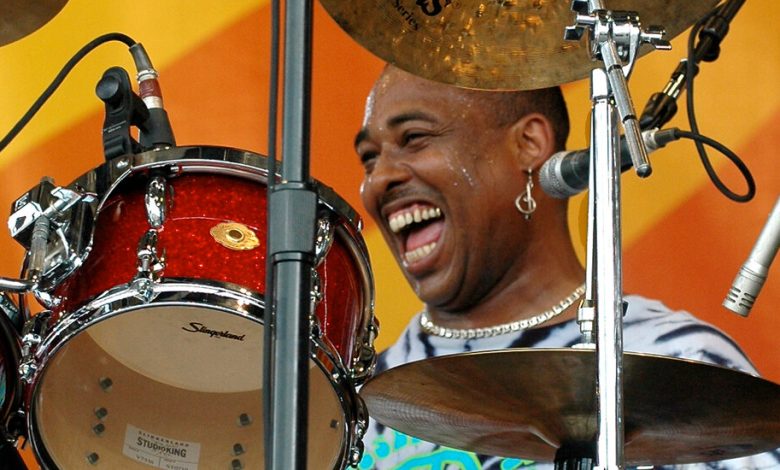Russell Batiste Jr., the Drumming Heartbeat of New Orleans, Dies at 57

Russell Batiste Jr., a pyrotechnic drummer and scion of one of New Orleans’s most celebrated musical dynasties, whose furious style and genre-busting approach provided the rhythmic pulse for bands like the Meters and Vida Blue and musical artists like Harry Connick Jr., died on Sept. 30 at his home in LaPlace, La., outside New Orleans. He was 57.
The cause was a heart attack, said his brother Damon Batiste, a former percussionist with the Batiste Brothers Band and a former producer for the New Orleans Jazz & Heritage Festival.
As a member of a family that has put its stamp on New Orleans music for generations, Russell Batiste was a mainstay of the city’s funk and R&B scene, performing with a long string of prominent local bands like George Porter Jr. & Runnin’ Pardners, the Wild Magnolias and Dumpstaphunk.
A multi-instrumentalist and songwriter, he pushed boundaries with the trio Vida Blue, named after the Cy Young Award-winning pitcher of the 1970s and ’80s. He formed the group in the early 2000s with Page McConnell, the keyboardist for Phish, and Oteil Burbridge, a bassist with the Allman Brothers Band. With its atmospheric blend of jazz, funk and electronica, the trio recorded three albums, starting with its debut release in 2002, and toured extensively in that decade.
Even so, New Orleans was where Mr. Batiste’s music seemed to belong. His bands Russell Batiste & Friends and Russell Batiste and the Orchestra (sometimes spelled Orkestra) From Da Hood packed local clubs like the Maple Leaf Bar and Le Bon Temps Roule for years, channeling the city’s rich, diverse musical heritage.
“He captured the spirit of Congo Square,” Damon Batiste said in a phone interview, referring to the New Orleans site where enslaved people were allowed to gather for music and dance in the early 19th century. “Everything he played was funk, but he blended in marching band, second line, Haitian, Cuban and African rhythms. He was playing to the spirits of our ancestors.”
Playing with a ferocity that would sometimes shatter his foot pedals, he added, Mr. Batiste “was like lightning and thunder, all at the same time.”
Even as a sought-after sideman on albums like Mr. Connick’s “She” (1994), Mr. Batiste said he was more interested in finding musical transcendence through collaboration than in gaining individual glory.
“Anybody can solo,” he said in a 2005 interview with Modern Drummer magazine. “Anybody can sit behind the drums and go nuts. Anybody can play riffs on the bass, and anybody can play songs on the piano. But playing music is when two or more people get together from out of nowhere and turn it into something.”
David Russell Batiste Jr. was born on Dec. 12, 1965, in New Orleans, the oldest of three children of David and Patricia (Cummings) Batiste. His parents divorced in the early 1970s.
Born into a family of musicians, young Russell seemed to have his course mapped out for him from an early age. His father played with soul luminaries like Jackie Wilson and Isaac Hayes in the 1960s and ’70s and was a member of the Meters, the seminal New Orleans funk band, before starting his own influential funk band, David Batiste and the Gladiators. It later merged into the noted family ensemble the Batiste Brothers Band, led by his brother Paul.
Russell’s younger cousin Jon Batiste is the Grammy Award-winning pianist, singer and songwriter and former bandleader for “The Late Show with Stephen Colbert.”
“When I was growing up, I’d see Russell at the Maple Leaf and his band the Orchestra From Da Hood,” Jon Batiste said in a recent television news interview. “He was our kind of blueprint.”
Russell did not take long to establish his identity within the family. He started gigging with the Batiste Brothers Band at local clubs when he was 6. “When I was 8 years old, I opened up for the O’Jays and the Drells and the Chi-Lites at City Park Stadium,” he said in a recent interview on the podcast “The Jake Feinberg Show.”
At St. Augustine High School, Mr. Batiste played drums in the school’s nationally famous Marching 100 band.
After graduating in 1983, he enrolled at Southern University at New Orleans, where he studied under the jazz saxophonist Kidd Jordan (who died in April). But he left college after two years to become the drummer for the singer Charmaine Neville (who comes from another New Orleans music family). He joined the Meters, which evolved into the Funky Meters, in 1989.
By that time, however, Mr. Batiste was battling substance abuse, which impeded his career for a time, Damon Batiste recalled. “Imagine being a rock ’n’ roll star, and people loved to be around you and you’re naïve,” his brother said. “He didn’t have his family around him.” Russell found sobriety in the 1990s.
In addition to his brother Damon, Mr. Batiste’s immediate survivors include his father; his mother, Patricia Johnson; his stepfather, Newman Johnson; his sisters, Tasha Batiste, Lakisha Johnson, Monique Santiago, Merinda Bell, Tish Allen, Eboni Batiste and Chanell Batiste; four other brothers, David Guys, Aaron Duncan, Jamal Batiste and Ryan Batiste; his sons, Christopher and Darryl; and a daughter, Nareal.
Considering the family he came from, Mr. Batiste could never have imagined another career, he said late in life. “I was born with a pair of sticks in my hand,” he told Mr. Feinberg.
Recalling an old family 8-millimeter home movie, he added: “I’m not even 1 yet, and I’m sitting on a lady’s lap behind a set of drums with a pair of sticks hitting the drums. That’s the way I was born, man. It was just in me.”